A solid foundation is essential for the stability and longevity of any home. Over time, various factors such as soil movement, moisture fluctuations, and structural wear can compromise a foundation, leading to serious issues. Foundation repair not only restores structural integrity but also enhances property value and prevents further damage. Understanding the significance of foundation repair can help homeowners make informed decisions about maintaining their property.
Recognizing the Signs of Foundation Issues
Foundation problems often start subtly before escalating into major concerns. Homeowners should be aware of early warning signs to address issues before they become costly repairs.
- Cracks in Walls and Floors: Small cracks may seem harmless, but they can indicate underlying foundation shifts.
- Uneven or Sloping Floors: A noticeable tilt or dip in flooring suggests movement beneath the home.
- Doors and Windows Sticking: When doors and windows fail to close properly, foundation shifts may be to blame.
- Water Pooling Around the Foundation: Excess moisture can erode the soil supporting the foundation, leading to instability.
- Gaps Between Walls and Ceilings: Structural separation is a major red flag that demands immediate attention.
How Foundation Repair Enhances Structural Integrity
Addressing foundation issues promptly prevents further deterioration and reinforces the overall structure of a home.
- Prevents Further Cracking and Settling: Timely repairs stabilize the foundation, preventing additional shifting and damage.
- Strengthens Load-Bearing Capacity: Reinforcing the foundation ensures that walls, floors, and roofs remain secure.
- Reduces Risks of Water Damage: Repairing cracks and improving drainage protects the home from water infiltration and mold growth.
- Enhances Safety: A compromised foundation poses safety hazards. Professional repair eliminates risks of collapse or structural failure.
Boosting Home Value Through Foundation Repair
A strong foundation is one of the most critical factors in determining a home’s market value. Investing in repairs can significantly enhance property worth and appeal to potential buyers.
- Improves Curb Appeal: Visible foundation damage can deter buyers, while a well-maintained structure enhances the home’s aesthetic.
- Increases Marketability: Homes with solid foundations are more attractive to buyers and lenders, ensuring a smoother selling process.
- Protects Investment: Repairing a foundation prevents costly future issues, preserving the value of the home.
- Qualifies for Better Insurance Rates: A stable foundation reduces risks, leading to more favorable homeowners’ insurance policies.

Common Foundation Repair Methods
Different techniques are used to address foundation issues based on the severity and type of damage.
- Slab Jacking: A process where a grout mixture is injected beneath a sunken slab to lift it back into place.
- Piering: Steel or concrete piers are driven deep into the soil to provide additional support and stabilization.
- Sealing Cracks: Epoxy or polyurethane injections seal cracks to prevent water infiltration and further deterioration.
- Soil Stabilization: Addressing soil conditions around the foundation ensures long-term stability.
Preventative Measures to Maintain a Strong Foundation
Regular maintenance can prevent future foundation issues and prolong the stability of a home.
- Control Moisture Levels: Proper drainage, gutters, and landscaping prevent excessive moisture buildup.
- Monitor Trees and Roots: Large tree roots can interfere with the foundation; keeping them at a safe distance is crucial.
- Inspect Regularly: Routine inspections help identify issues before they escalate into costly repairs.
- Address Plumbing Leaks Promptly: Leaks under the foundation can lead to soil erosion and structural instability.
Conclusion
Foundation repair is an essential investment in maintaining the structural health and value of a home. Addressing issues early prevents costly repairs, enhances safety, and boosts property marketability. By recognizing warning signs and implementing preventative measures, homeowners can ensure their foundation remains strong for years to come.
FAQs
Q1: How do I know if my home needs foundation repair?
A1: Signs such as cracks in walls, sloping floors, sticking doors, and water pooling near the foundation indicate potential issues.
Q2: Can foundation repair increase my home’s value?
A2: Yes, a strong foundation enhances structural integrity, improves marketability, and prevents costly future damage.
Q3: What is the most effective foundation repair method?
A3: The best method depends on the issue; piering, slab jacking, and crack sealing are common solutions.
Q4: Is foundation repair expensive?
A4: Costs vary based on severity, but addressing issues early can prevent more expensive repairs later.
Q5: How can I prevent foundation problems in the future?
A5: Maintaining proper drainage, monitoring soil conditions, and conducting regular inspections help prevent foundation damage.
